We held an event “not Divide but Share” – Education in Sweden Vol.2: School is a Microcosm of Society (Theme: Inclusive Education)” on June 16th, 2018 at KOKUYO Studio in Shinagawa, Tokyo.
We had about 40 attendees, and more than half of them were those from education service. We also had attendees such as parents who have kids, business persons from HR and teacher / social workers for children with disabilities. One quarter of them were repeaters.
What would you like to do if you were given the chance to turn into the opposite gender?
We shared opinions amongst each other about the following question: What would you like to do if you were given the chance to turn into the opposite gender? And we got so many ideas/opinions about it.
However, Ms. Matsui points out that if you ask the same question to Swedish students, most of them cannot understand what that question means because the role does not change according to gender in Sweden. Thus asking this question made us realize that there is difference between Japanese and Swedish society regarding gender-roles.
After the first session, we had a presentation from Ms. Hisako Matsui about the differences between the ways of Japanese and Swedish “inclusive education system” from a teacher’s and mother’s point of view. Ms. Matsui has lived in Sweden for 24 years, and before that she was working as a high school teacher in Japan. Now she is working as a Japanese teacher at Tumba high school in Stockholm while raising 3 children. We also had 4 guest panelists from Sweden who have educational experiences both in Japan and Sweden.
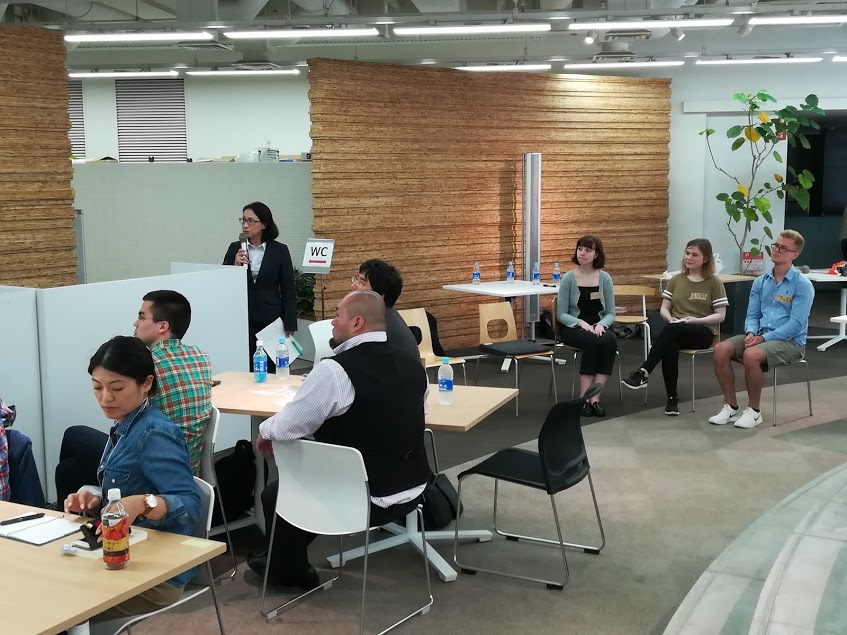
Equal educational opportunity for everyone – Open schools for local communities and guarantee learning opportunities in native languages-
First, Ms. Matsui told us about some differences in the school systems between Japan and Sweden. Such as,
- they don’t have textbooks authorized by the Ministry of Education like in Japan, so teachers can make their own decision about teaching
- all citizens have right to education and equality of educational opportunities by providing school education for free both in public and private school
- citizens can start learning at school anytime regardless of age, so there are also some older students at university
- in Tumba high school, they use various public facilities near the city like gymnasium, skating rink, and Municipal hall. And vice versa, they let other citizens use their facilities like cafeteria for primary school students, so they are deeply connected to local communities.
There are a lot of immigrants living in Sweden, so in school, students have diverse backgrounds. All immigrants have guarantee learning opportunities in their native language during preschools to high schools, so now they have classes for non-native Swedish speakers in 34 languages. Especially in Tumba high school where Ms. Matsui works, they give them an opportunity for learning with a special teacher in other languages even if there is only one participant whose native language is not Swedish.
Incorporate the student council’s opinions into a school administration – Learn by practicing, real democracy –
In Tumba high school, students have two meetings in class, one sector meeting, and also one representative meeting every semester. And in the end of year before summer vacation, teachers incorporate the student council’s requests into a school administration at their meeting. Requests are sometime covering jurisdictional areas of teachers. For example:
- for improving timetable (late start time, long break time etc.)
- for adjusting frequency of exams
- for digitalization of handouts and board writing etc.
A few years ago, teachers were obliged to make personal interviews with all the students within their class time in the beginning of a semester because of requests from students that they want to make better communications with teachers indeed.
Inclusive education, and creating a system to support it
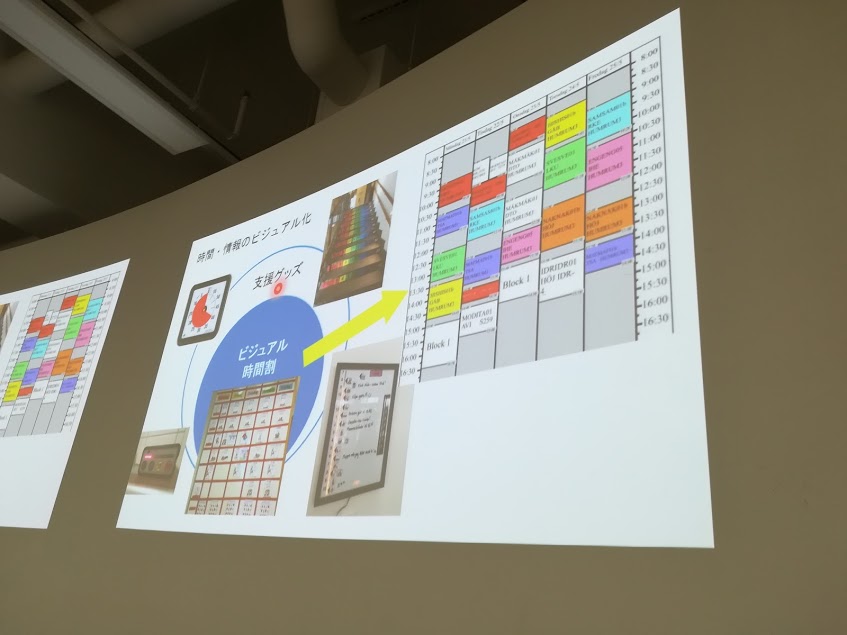
In Sweden, there is no school for visually impaired people, so they need to go to ordinary schools with other kids. So, the school makes special arrangements for them like choosing a well sunlit classroom, changing the font of handouts to be easily visible, and distributing handouts beforehand in digital format.
in Tumba high school, there are 45 students in a class for autistic spectrum people (mainly people who are undergoing diagnosis of Asperger’s syndrome), so the school has prepared a system to respond to the needs of diverse students by aligning multiple faculty members not only for teaching teachers but also guidance counselors, special needs educators, librarians, and specialists for healthcare.
How teachers in Sweden works – Flexibility of working conditions and relationships with students –
Some of the working conditions of teachers in Sweden. Include working 35 hours a week. That is much less compared to a Teacher in Japan. Their salaries are not determined by how many years they have been working, but by negotiating with the principal every year. And there is no job transfer even in public school. Moreover, in the case of high-school teachers, they can make requests on preferred time schedule so that the school can adjust the time schedule flexibly based on the needs of teachers. For example, Ms. Matsui made a request to work only 68% of the full-time schedule so that she can take a course on career developments and spend time for with her family.
And how about the relationships with students? In Sweden, teachers respect students’ opinions and their rights as they do with adults, they don’t treat them as children. In this section, there are a lot of opinions from Ms. Matsui and guests about the important points when teachers treat students, and about the teaching methods. Details are following:
How to treat students
Question: “What is required by students for teachers in Sweden?
Elvila(guest): “Sweden is the kingdom of casual talk. We don’t have any polite expression in Swedish, so we call teachers with their first name. I think it is one of the reasons why our relationship is so close between teachers and students. We also always ask a reason when teachers ask us something to do, because we have been told that we should keep our curiosity of asking “why” from a very young age. If you don’t understand a reason by asking questions, it is really hard to increase your motivation for the project.”
Ms. Matsui also has the same experience. At the beginning of her work in school, she was confused because students always asked her “Why?” from the very first moment when she asked them to do something. Even in elementary school, teachers always need to describe why students need to do that in a class, otherwise no one will be motivated.
Some of students think that it is really important to build a friendly relationship with teachers. As the sense of intimacy with teacher creates a good relationship with them, then students’ motivation rises as a result. It seems that it is the way of Swedish style thinking.
The Teaching Methods
It is common style in a Japanese classroom that teachers talk 90 %, and students copy from the blackboard. On the other hand, in a Swedish classroom, it seems that there are so many activities that can only be done at schools with a group, not alone. For example:
- Most of time, they are working for group activities, discussion and presentation.
- They audit parts of programs of universities through collaborations.
- Implement an interdisciplinary project. (ex: Discuss about George Orwell ‘s work “1984” in social studies and English class.)
- Conduct a political debate at school in the social study class. Sometime political parties came to the school to hold discussions, and students divided in to eight political parties and hold discussions and mock polls.
Furthermore, there are two more features. One is a way of correcting mistakes (they don’t point out small mistakes but only big mistakes. Priority is being spontaneity, so teachers don’t let them being afraid of making mistakes), and the other is a way of evaluating students (purely evaluated by attainment level of their knowledge and skills, not by days attendance and attitude).
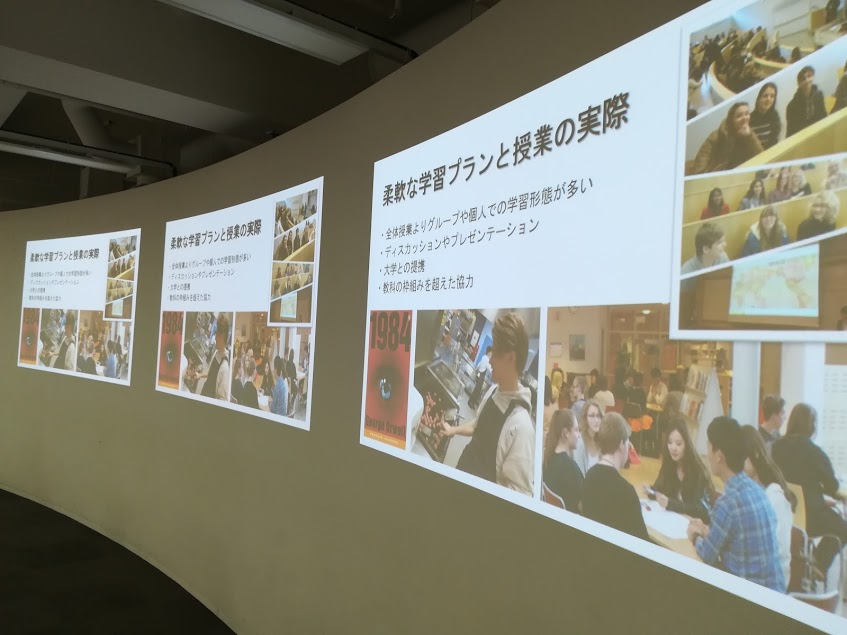
Problems and Tasks
Now some problems and tasks are considered as issues in Sweden such as a problem of declining of PISA’s score for a few years, enrichment of teacher training education programs, or improvement of teachers’ status, and a variety of measures are taken for it.
Group discussion
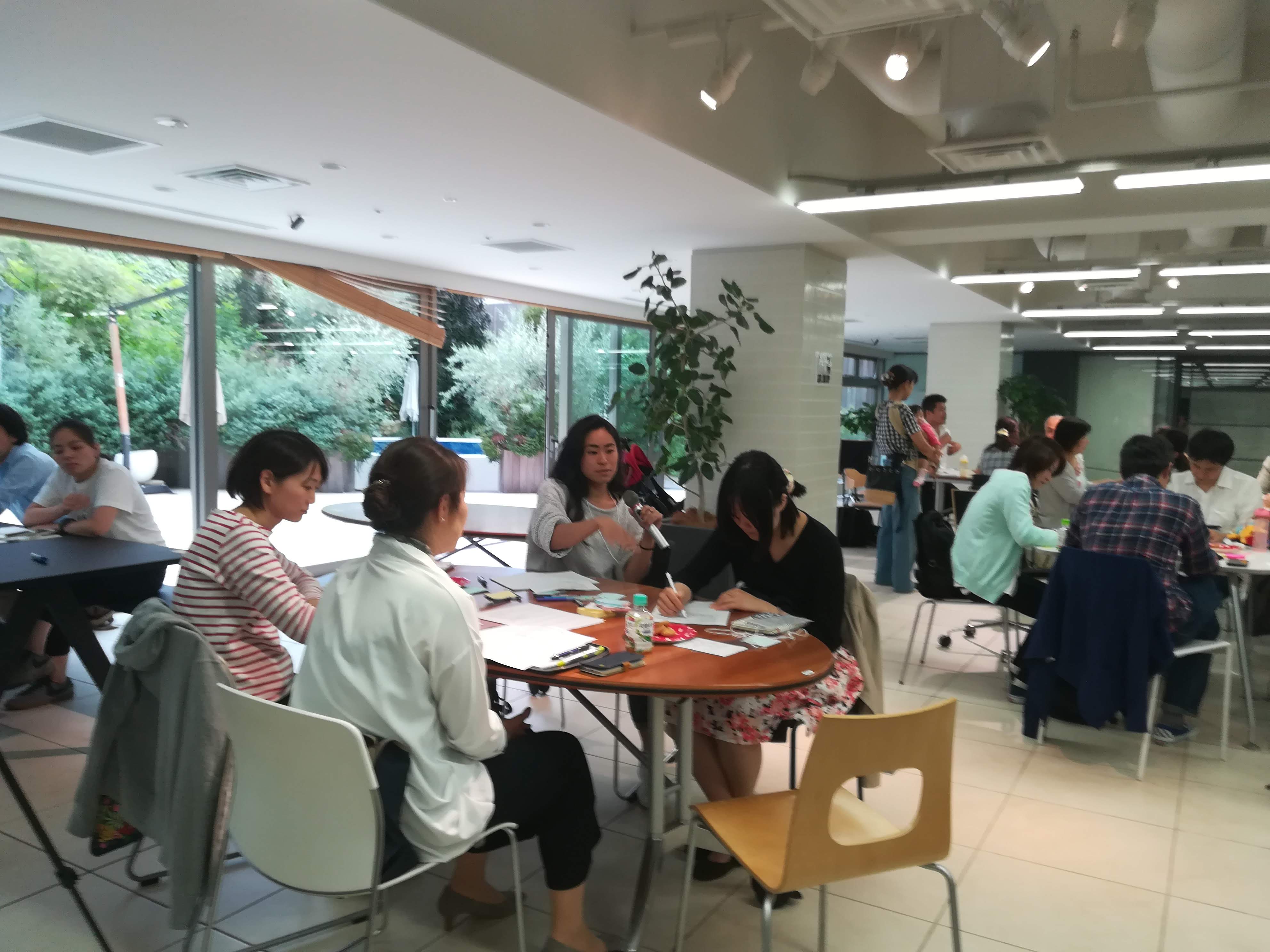
After taking Swedish coffee break “FIKA” between the presentation and enjoyed talking with other attendees, we had a group discussion and talked about the things that remained in impression. Ms. Matsui and guests also joined the group. The part of discussion is following:
- Is it possible to achieve both increasing personality and being cooperative?
We can respect each other since we respect our personalities, then also we can be tolerant to others. People will not lose their cooperativeness completely, and can reach a consensus with a great balance.
- In japan, we sometime feel “personality” means “selfish” partly, how about in Sweden?
It might be so compared to Japanese, but its’ just that they discuss with others when something anxious. In Sweden, it is a legitimate right to make an assertion and also people can read the situation on some level. People can cherish others because they can feel respected. They just need discussion when they have problems. In Japan, people tend to feel being criticized in the argument, but in Sweden, people think they cannot understand anything without asking “Why” and “How do you think?”. It is more important for them at school having discussion with others to know how other people think than learning knowledge.
- I think it is so wonderful that students have opinions for small things to big things regarding school management such as school regulations, and the school incorporate it.
There is an environment where you can ask anything when you have a question. And students always devise how to express their needs to achieve their goals.
- It cannot be happened in Japan that student have the right to negotiate with teachers regarding teaching method such as volume or content of the homework.
Of course, students need high negotiation skill to persuade teachers. It will be not accepted if students only tell teachers their wishes/opinions. They need to have critical thinking skills to convince other people because they have been thinking in that way from the very early age.
After the discussion, for the conclusion of this event, we asked 3 Swedish guests to give their thoughts. And here are the common ideas from the guests:
- Since I have never thought about Sweden deeply, it was really meaningful time for me to think about my own country again while listening to the questions from Japanese people.
- It is really good opportunity to rethink about strengths and weaknesses of Japanese and Swedish education.
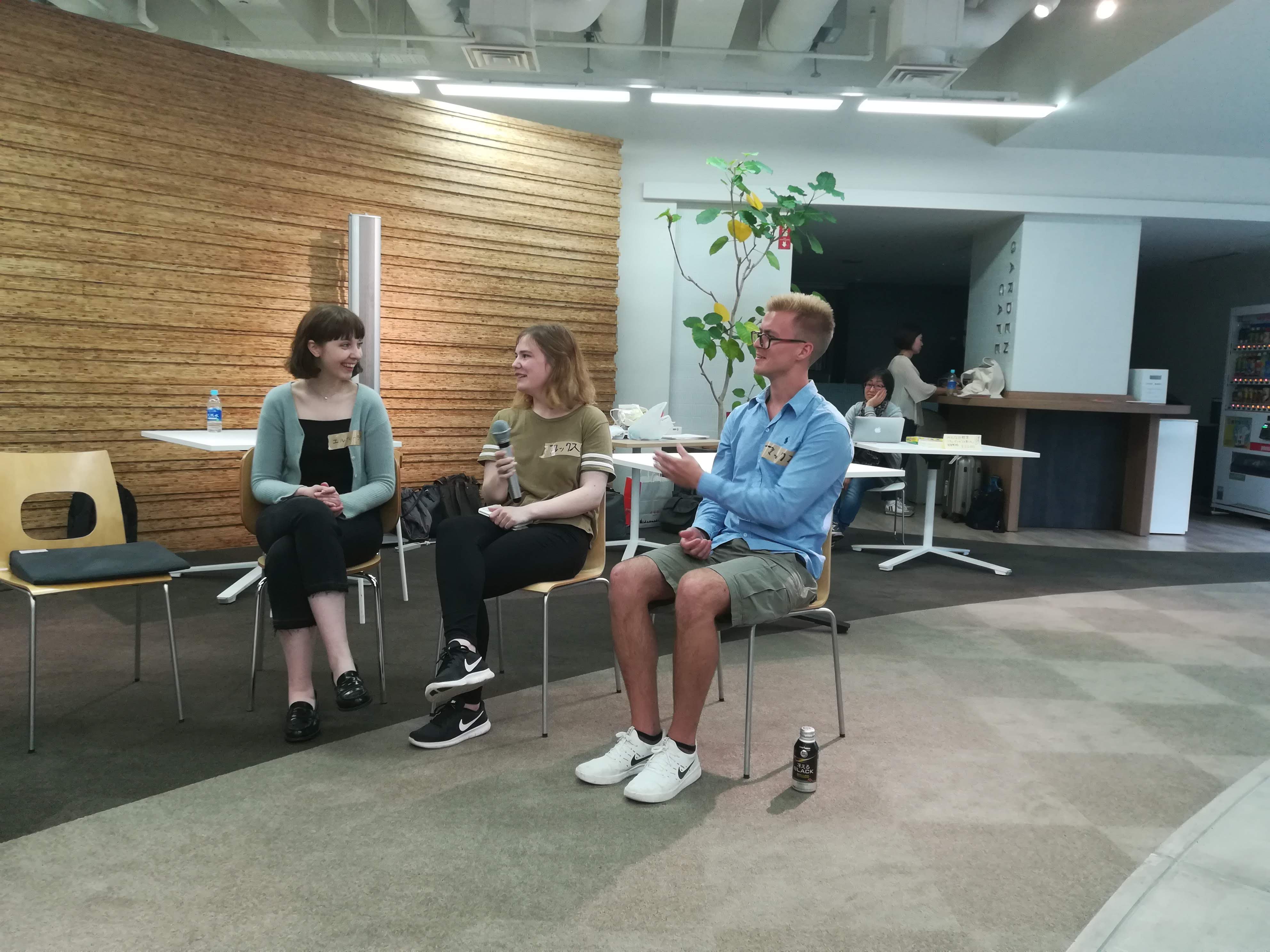
Here are some additional questions from attendees:
- What does “Adult” mean in Sweden or what kind of people are called “Adult”? What kind processes are needed for becoming an adult?
- There are diverse backgrounds from different races and cultures and is there any conflict between people of different backgrounds? If there is, how to deal with it?
- What is “dialogue” mean in Sweden? Is it different from Japanese one?
- What is the difference from business in Japanese school?
Feedback from participants (abstract)
- To respect personality and to know the difference from others make cooperative attitude of people. To know each other, we need discussion.
- Before coming here, I thought the workshop was about how to teach students together with the handicapped students in the same class, but the meaning of “Inclusive Education” was much broad sense than I thought. I had a really fulfilling time. And I think it is really wonderful for high school students to be able to take a part on decision regard learning environment, learning contents and grade evaluation. Letting students take a part in school management makes them to have independent-minds. I learnt that it is really important to let kids have questions “why?” to everything from a very young age and to respond it sincerely. I really would love to join next time too.
- I wanted to ask Ms. Matsui for an advice what we can do in Japan at first, but I changed my mind that we should think about it by ourselves after this event.
- I was surprised for the education to value individuals and the effort to realize it. I’m working as a teacher of special support class in Japan, but it is more supplementary, not ordinary.
- I joined this event because after having baby for my ownI became to have questions about Japanese education and the atmosphere where you cannot assert. Ms. Matsui’s word was really impressive that “Students always question ‘why’ to everything and they need to know the reasons otherwise no one will be motivated.”.
- It was really interesting to know that they have opportunities for discussion between teachers and students. I think it is really good for them to have the same system as a part of society.
Report by: Rie T.
